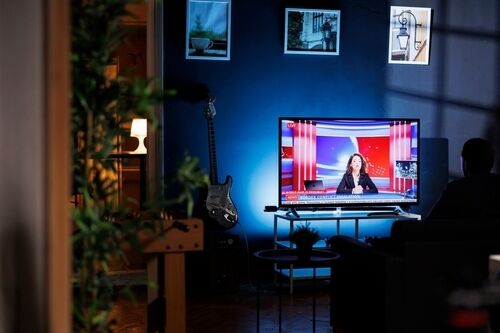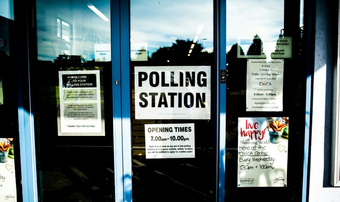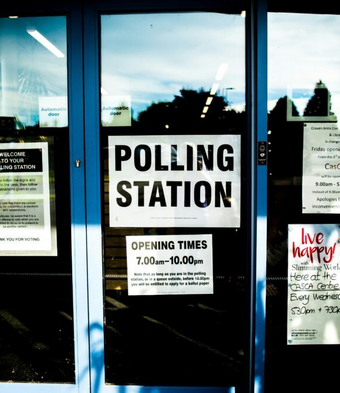Politics as Entertainment

Britain’s 2024 election lacked pizzazz. The charismatic leaders featured in the TV debates of 2010, were replaced by rather drab figures in the form of a beleaguered Rishi Sunak and a Keir Starmer without a better story to tell.
The sheer number and depth of the issues facing Britain did not lend itself to the snappy-empowering slogans of the EU Referendum or 2019 “Brexit” election, though perhaps better political operatives would have managed to find one. Add to that the weariness of the public with the governing party, coupled with the ever-increasing, never-stopping, splurge of tales about their failures and malpractice meant the conclusion was a foregone conclusion from the off.
Despite the best efforts of Ed Davey and his merry band of Liberal Democrats to ignite some energy and fun into the election, the majority of us largely reconciled ourselves to the doomy circumstances set before us.
Following a summer of rioting, rebellions on the backbenches, and the introduction of a political agenda which is beginning to look, in part, rather like the austerity of 2010-2015, Keir Starmer’s first few months in office have largely continued the tales of woe we have become accustomed to. Whilst somewhat politically astute, Labour’s wearying insistence that absolutely everything is the Tories fault and is definitely much worse than we thought, only compounds matters.
A new poll published just this morning confirmed such sentiment with a 6% drop in the voting intention for Labour, once again hinting that the 209-seat swing to Labour was about kicking the Tories whilst they were down rather than an endorsement of Labour’s package for ‘change’.
In part, this is because for all that the politicians at the top have changed, our way of doing politics is fundamentally the same.
We are seeing, yet again, that political office is an office of performance not substance.
Now of course, politics has always entailed an element of performance. There are many traditions encapsulated in our own political history that exist to communicate a message and a story more than perhaps do anything. For instance, the slamming of the doors of the House of Commons on Black Rod, the messenger of the monarch, is a piece of political theatre. It communicates that the monarch is limited in their power, that true authority lies in the Commons, and that MPs serve the monarch by will not by force.
And obviously, politicians still have the task of legislating, and scrutinising legislation, and if so appointed to Government, governing. Yet the art and necessity of performance dominates the political agenda.
And as the US Presidential Election once again made headlines this past week, I was struck by the clear coalescing of politics and popular culture in a manner resembling some weird form of entertainment.
Donald Trump of course encapsulates this sentiment well. A businessman and reality TV star, he stormed to Presidential victory back in 2016 in part because he was entertaining. He avoided convention, provoked and wound up his opponents, and repeatedly made the headlines with outrageous statements that were designed to entertain and to capture an audience.
Lawsuits, exposes, and political protest could not budge his appeal, and in some ways only deepened it.
And though he lost to Joe Biden in 2020, the 2024 presidential election looked set to follow the way of 2016. As before, nicknames and memes saw Trump storm through the Republican primaries before setting up his re-match with President Joe Biden.
With rumours of Biden’s deteriorating health widespread, controversies of his own, and a mixed record of his time as President, Trump the entertainer looked set to walk the Presidential race, particularly following Biden’s disastrous performance in their debate in June.
That is until, the poverty of Biden’s debate led senior Democrats to move against him fearing the return of Trump. Politicians and celebrities alike urged Biden to go, and ultimately, he had little choice but to make way.
Few would have guessed that within a few months, his much-derided Vice President Kamala Harris would have enjoyed a summer of success as the new Democrat nominee. But then again, she has understood her role and read the mood-music – politics is about performance. It is really all about the vibes.
Mere days after her announcement her popularity soared when on the 22nd July pop star Charlie XCX tweeted “kamala IS brat” a reference to her latest album which would become one of the soundtracks of the summer. Kamala’s team moved quickly to capitalise on the endorsement and its social media potential with great reward. Over August, the Vice-President’s popularity increased and saw her supplant Trump as the Presidential frontrunner
Polls had begun to close by early September, however. At least that was until the ultimate piece of political performance theatre took place this week, as the two candidates met for a televised debate.
Whilst TV debates are a rather recent political phenomenon for us here in the UK, Americans have been enjoying (if that’s the right word) them since the JFK - Nixon campaign of 1960.
Of course, to master the debate one needs to be across their brief, knowing the key debates, policies, and aspects of the role of president – something Biden lacked back in June – but it is a format that lends itself not to substance, but to show.
And if one were to watch the debate (disclosure, I could only stomach 37 minutes of it) show is what you would have seen. Policies and records were debated, there was some substance, but by and large this was about show. For instance, Kamala opened by making a point of shaking Trump’s hand in a show of magnanimity that backed him into a corner from the off.
In what could have been a substantive discussion about immigration policy, the debate descended into a bizarre argument about the size of Trump’s political rallies. Meanwhile, as Trump blundered into hazy territory, Kamala could be seen laughing at the incredulity of his answers, the perfect performative tool to send home her central campaign message – Trump is “weird”.
Following the debate, global superstar Taylor Swift subsequently came out and endorsed Harris to her 283 million followers on Instagram. This is an election playing out in the pop culture sphere as much as in the political one…
Now American politics and its presidential system with its hundreds of millions of dollars, private campaigning jets, and hyper-partisan political culture is perhaps unique in the extent of its performativity, but our politics likewise drifts into the shallow but performative.
Take for example, the Rwanda plan, presented as a solution to the problem of small boat crossings by the former Conservative government. Hundreds of millions were spent on the plan, which was then immediately revoked by the Labour government before it could really get going, but critics argue it would never have got going – it was a mere political stunt to be seen to be doing something.
Similarly, political campaigns obsess over optics. With MPs travelling from photo opportunity to photo opportunity, talking up their local connections, and posting soundbites and clips of their speeches for easy consumption on social media. Or look back to the premiership of Liz Truss, where our whole nation was captivated by the video of a rotting lettuce…
And perhaps here is where we get to the nub of the issue, just as televised Presidential debates have altered politics so too has mass media, 24/7 news, and social media.
There is much that could be said here but let me focus on two key aspects and how that relates to us as Christians. Firstly, access to, and influence on, politics appears greater than ever before. Second, the noise and distraction are endless.
Social media and the entertainment complex have given us unparallel access to and great influence on politics that much cannot be doubted. After all, there is a reason why MPs clip up their speeches into bite sized chunks – so that we will consume them. There is a reason why they share pictures of all the campaigns they are associated with, they want to demonstrate (or at least appear to demonstrate) that they are busy and active.
In a world where everything is entertainment, where everything is designed to be consumed by the masses, we can follow along their every action. We can watch their every mistake. We can highlight every bad comment they’ve ever said.
As a result, we have untrammelled means by which to hold them accountable, pressurise them, and contact them 24/7 letting them know our every thought and wish. We can not only write to them or meet them. We can message them directly. We can click a link which automatically sends them a 400-word long email on our behalf about a cause we vaguely thought about when it passed by on our new screens.
And whilst TV has given us political drama for years, including the brilliance of the West Wing or the Thick of It, social media and 24/7 news lets us watch the drama unfold before our very eyes with memes, commentary, and hot takes a constant option to us. Even many of our most popular podcasts give us a sense of insight, a feeling of being close to those in the know, and help fuel our consumption of politics as entertainment
Access is easy and quick. Influence appears within our grasp. Yet, it’s all just noise.
All too easily does the politics as entertainment angle lead to distraction, to endless doom scrolling, to the relentless consumption of information, to the increased perversity of memes and political satire, to an overly harsh assessment of anyone in public life, and ultimately to the hollowing out of our political and public life.
As Christians, we know that government is an institution ordained by God, that for all our leaders’ failures and faults, it is a noble office to seek and a difficult burden to bear.
1 Timothy 2 tells us “I urge, then, first of all, that petitions, prayers, intercession and thanksgiving be made for all people— for kings and all those in authority, that we may live peaceful and quiet lives in all godliness and holiness.” We are to have a respect and a reverence for our politicians that expresses itself in prayer – a recognition that the role they undertake is one that ultimately is accountable to the Lord.
Perhaps we would do well to quieten ourselves, to be concerned with living peaceful and quite lives detached from the endless cycle of political noise and drama which substitutes for substantive action. Perhaps we would do well to pray that our leaders and politicians would have the wisdom, the discipline, and the understanding of the times to cut through the noise and drama that they might be diligent in their duties to legislate and to govern.
Symbols, performance, art, all matter. The solution is not to prohibit them or to ban journalism and media coverage of politics. After all, one of the reasons our election was so dreary was precisely the lack of deep and meaningful stories and symbolism, instead we had to make do with MPs falling off paddleboards and doing Zumba.
Stories and symbols can communicate deep truths and meaning to us. Well used, they can be valuable tools in a politician’s armoury and be of great service to a people as they navigate challenges and opportunities. Politics has a moral function after all, to uphold good, to abhor evil and to so orient the people likewise.
The problem then is not with performance in politics per se, but with a politics so performative it is no more than mere entertainment
We must pray for ourselves, and for our politicians, that we can navigate through a politics orientated towards entertainment and consumption, that we and they might have wisdom to navigate instead through the substantive issues of our day.






